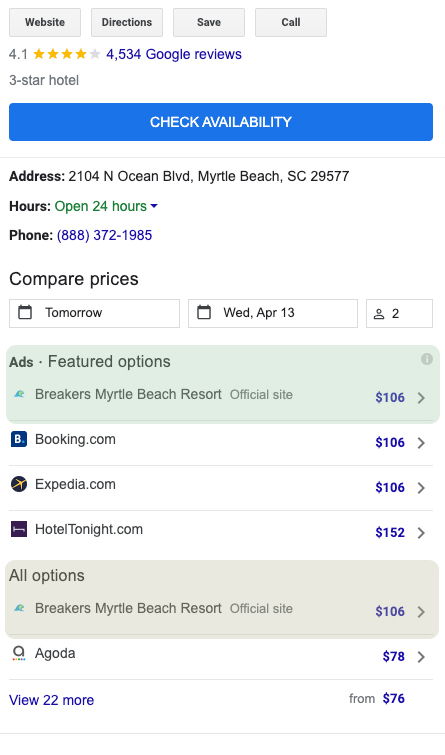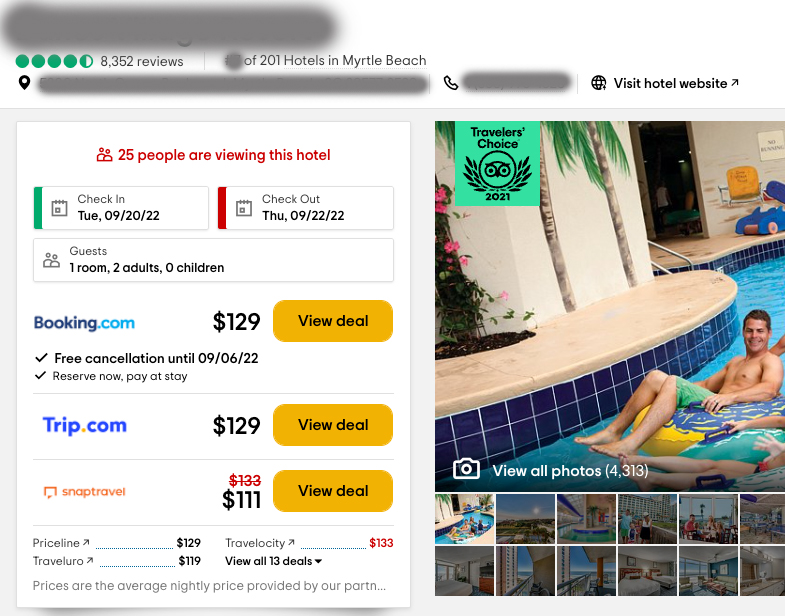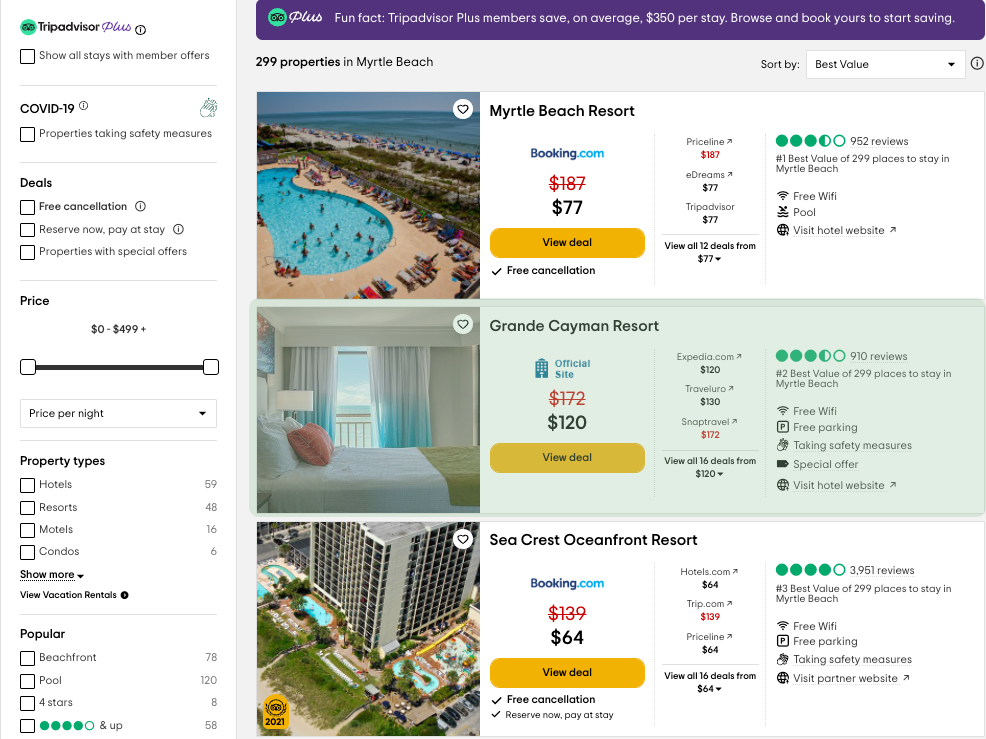A Guide to Hotel Metasearch Marketing
by Pete DiMaio
In the quest to increase direct bookings, many hotels often find themselves limited by a narrow range of strategies. While marketing efforts such as social media or content creation help generate awareness, they don’t always capture a guest at the critical moment they are ready to book. Even paid search options like Google Ads, though effective, fall short in seamlessly incorporating a hotel’s rates into the traveler’s decision-making journey. This is where hotel metasearch marketing becomes essential, especially for independent hoteliers.
The Importance of Hotel Metasearch Engines
According to a study by EyeForTravel, 94% of travelers regularly use metasearch sites when planning a vacation. In most cases, travelers may not even realize they’re using a metasearch engine—they simply see the rates for the dates they’re interested in at the property they’ve chosen. This information often appears as organic search content, making it highly trusted and frequently engaged with.
For example, a search results page for “Myrtle Beach hotels” typically shows at least one paid position at the top, a significant metasearch presence in the middle, and organic results below the fold (followed by more paid ads).
What many hoteliers may not realize is that even if they’re not actively participating in a metasearch campaign, their property is still being displayed with a rate. OTAs aggressively bid and display nightly rates for your property. This is why we recommend every property adopt an aggressive metasearch strategy to ensure their best book-direct rate appears in as many metasearch opportunities as possible, particularly on Google Hotel Ads.
Participating in metasearch is similar to bidding on brand terms in your hotel PPC campaigns and should be a standard part of your overall marketing strategy. If you’re not participating, someone else will take your spot on the SERP and potentially capture the booking. As the two examples show, it’s clear that an organic strategy alone is no longer enough in today’s SERP landscape.

Beyond Google Hotel Ads (GHA), several major players dominate the metasearch landscape, including:
- TripAdvisor
- Microsoft Hotel Ads
- Kayak
- Trivago
- Hundreds of niche engines…
A savvy hotelier understands the importance of having a presence on as many metasearch engines as possible to maximize direct bookings. Failing to do so means conceding ground to OTAs and missing out on valuable direct bookings.
Why does metasearch matter for independent hoteliers? Simple – if you’re not participating in metasearch, you’re offering guaranteed bookings to the OTAs, costing you money, guest relationships, and future revenue opportunities.
Your Guide to Hotel Metasearch Marketing
Now that we understand the importance of participating in the metasearch space, hoteliers must ensure they are able to do so. This will largely depend on your booking engine, PMS provider, and the level of management access available to you.
Does Your Hotel’s PMS or Booking Engine Support Metasearch Integration?
In most cases, your hotel’s PMS or booking engine will have the ability to feed data to metasearch engines. If you already use a channel manager or GDS, sharing rates is likely possible. However, at TravelBoom, we’ve found that proactive management tools are rarely made easily accessible to independent hoteliers.
If your system does offer metasearch integration, there is likely a fee for the service, which is understandable due to the cost of managing, testing, and ensuring rate accuracy. Once a property has confirmed the ability to share rates, it can move on to the next step.
Google Hotel Ads (GHA) & Microsoft Hotel Price Ads (HPA) Best Practices

Both Google and Microsoft offer paid and organic rate displays in their metasearch platforms. However, in both cases, organic results tend to appear farther down the page or require an additional click to access. The example here shows a property bidding on its profile through Google Hotel Ads, with both paid and organic rates displayed.
As a hotelier, keep these tips in mind when managing your campaign(s):
- Claim your business listings and set up your accounts: For Google, use your Business Profile Manager. Here are some simple tips for claiming and optimizing your hotel’s GMB listing.
- Maintain a stable rate feed and high price accuracy: Ensure your rate data is always up-to-date and accurate.
- Offer the best possible rate: Even with a great campaign, guests won’t book direct if it’s cheaper on an OTA.
- Review your bid management rules and settings: This is the core of your campaign. Set your bids and limitations to target the right potential guests at the right time.
TripAdvisor Metasearch Campaign Management

TripAdvisor is the second most important metasearch engine for hoteliers. While some argue its value has declined, the image to the right clearly illustrates why managing your hotel’s metasearch campaign on TripAdvisor is essential.
Imagine a potential guest has chosen your property and is ready to book. They visit TripAdvisor one last time to check recent reviews. However, when they proceed to book, your property’s direct booking link is not displayed.

As a best practice, it’s crucial to bid for one of the top three positions on TripAdvisor while displaying your lowest possible rate. Otherwise, all the effort put into branding your property and encouraging direct bookings could be wasted, and one of the OTAs will secure the booking.
TripAdvisor’s bidding extends beyond just the rates shown on a hotel’s individual profile; it also impacts broader destination searches. The example here shows the Grande Cayman Resort promoting its direct booking rate in TripAdvisor search results. This ensures that when a guest is ready to book, they’ll be booking directly with the hotel.
Keep these tips in mind when managing your TripAdvisor metasearch campaign:
- Just like with Google, ensure your profiles are claimed and your accounts are properly set up.
- Don’t be tempted to always bid for the first position. We’ve found that conversion rates for positions one through three are quite similar, but the cost difference can be significant. As long as your property offers the best rate within the top three, you’ll secure the booking.
- TripAdvisor’s reporting may be clunky, but it offers valuable insights into rate display and performance—take advantage of these tools.
More Hotel Metasearch Engines

Kayak, Trivago, and dozens of other niche metasearch engines represent a significant portion of the metasearch landscape and should not be overlooked in your marketing strategy. As with any metasearch engine, if you’re not displaying your best book-direct rate, you’re essentially handing a booking to the OTAs.
Hoteliers can start by reviewing guest history data to identify which metasearch engines are driving the most bookings and then launch their campaigns on those platforms, one by one.
Managing each metasearch engine individually can be time-consuming and tedious, but TravelBoom’s metasearch management program simplifies the process by offering full campaign management across any desired platform. Regardless of how you approach your metasearch strategy, make it a priority moving forward.
Hotel Metasearch Management
In the past, metasearch was often complex, time-consuming, and expensive. However, through TravelBoom’s partnerships, we’ve developed an easy solution for almost any hotel. We’ll help you fully leverage metasearch with a straightforward pricing structure and a return that competes with many other digital marketing channels.
TravelBoom removes the guesswork from metasearch management. Our ROAS-focused program not only reduces OTA exposure but also drives significant direct bookings.
What sets TravelBoom’s program apart is our use of a blended budget and advanced systems to optimize exposure, delivering the highest possible return on investment. Get started by contacting us today.